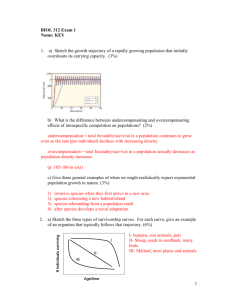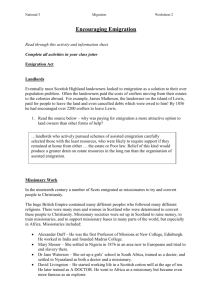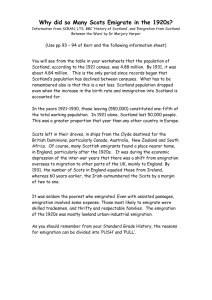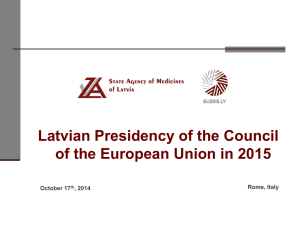Net emigration of Latvian nationals by destination, 2000-2011
advertisement
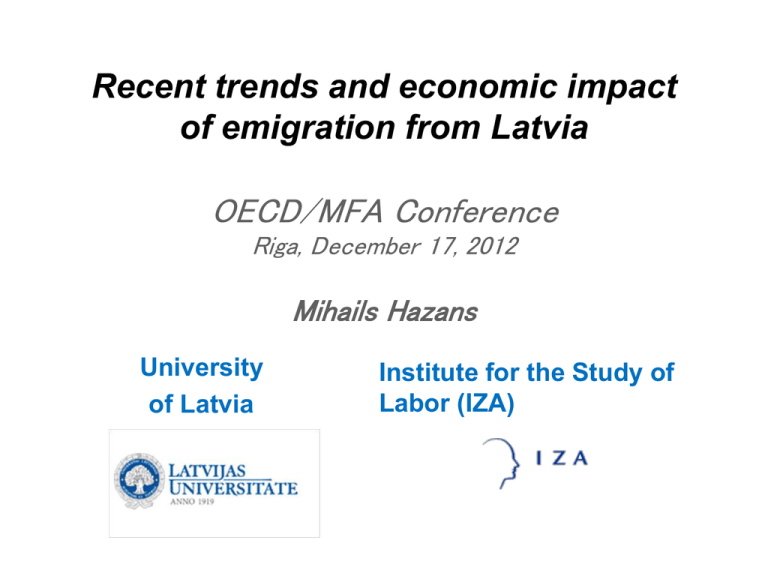
Recent trends and economic impact of emigration from Latvia OECD/MFA Conference Riga, December 17, 2012 Mihails Hazans University of Latvia Institute for the Study of Labor (IZA) Summary -1: The Exodus • Since the beginning of the 21st century, Latvia has lost 9% of its population (including almost 14% of working-age population) in several waves of emigration • The most recent wave is the strongest migration response to the economic crisis among the EU member states Summary – 2 : A threat and a resource • According to a recent (2012) survey, 77% of Latvia's population perceive emigration as the single largest threat to the country • Yet potentially large economic benefits from investment, trade and transfer of skills can be derived with the help of Latvian Diasporas - directly or by fostering return Summary - 3 • Despite recovering economy, emigration shows only weak signs of slowing down, while emigration potential remains high. • Recent emigrants are more likely to move in full families and less likely to return. • Lack of jobs and low earnings remain the leading reasons for emigration, yet noneconomic reasons (uncertainty, general dissatisfaction, etc.) are gaining importance, especially among university graduates Net emigration from Latvia, 2000-2011 Emigration and immigration (1000), 2000-2011: Top – CSB version; Bottom – corrected (CSB_Hazans) Emigration may have slowed down from the 2010 peak, but has it slowed back down to the pre-crisis level? Net emigration of Latvian nationals by destination, 2000-2011 Emigrants from Latvia (aged 22+) by completed education at the end of 2010 (relatives’ survey data) 100% 80% 31 24 32 23 25 36 15 28 30 36 27 Tertiary 60% Secondary 40% Basic or less NA 20% Period of moving Ethnicity and citizenship Host country Total Other/NA Continental Europe Ireland UK Minority/Other Minority/Latvian Latvian/Latvian 2009-2010 2004-2008 2000-2003 0% Estimated percentiles of emigrants' last earnings from all jobs as proportion of median earnings of all legally employed persons in the same month, 2005-2011 • Relative domestic productivity of the top half of emigrants with [legal] work experience was falling dyring the growth periods and rising during the recession brain drain risk is higher in the times of crisis • Domestic legal earnings of most emigrants were below median Elapsed duration of stay abroad Host country Education Ethnicity and citizenship Latvian emigrants' plans to return within 6 months and within 5 years, 2011/01 Minority/Other Minority/Latvian Latvian/Latvian Tertiary Secondary Basic or less Other/NA Continental Europe Ireland UK 5 - 11 years 3 - 5 years 2 - 3 years 1 - 2 years Less than 1 year Total 0% 5% 10% 15% 20% 25% 30% Plans to return within the next 6 months Plans to return within 5 years (but not within 6 months) 35% 40% Economic impact (1) • Emigration has contributed significantly to decline in unemployment and NAIRU... • ...but also to emerging labour shortages (now reported as limiting factor by 20% of construction enterprises and big manufacturing firms; elsewhere this rate is <10%); • ...which certainly will become a serious challenge in the near future • Emigration has a positive effect on real wages • Different approaches all indicate a significantly negative long-term effect of emigration on Latvia’s GDP, but the size of the impact varies Economic impact (2) • Estimated effect on GDP does not account for losing “the key employees” on one hand and for lower than average domestic productivity of most emigrants on the other • Remittances reduce negative effect on GDP by about 50%, but for how long? • By reducing population and hence the domestic market size, emigration discourages investment - both foreign and domestic • Economic theory and evidence from other countries suggest that FDI from and export to countries hosting recent LV emigrants could increase (yet to happen!) • Should we see the Diasporas (rather than the host countries) as potential trade partners and FDI sources? Emigration has contributed significantly to decline in unemployment and helped to contain social spending • • In 2005-2011, for 50 000 emigrants with labour market experience (31% of all such emigrants), the last registered economic activity was unemployment; in 2010-2011 this proportion was above 40%, and emigration directly reduced unemployment rate by at least 1 point. Emigration caused fall in U rate by 2.4 points in 2004-2008 (Barrel et al. 2007) and decline in NAIRU by 0.4 points in 2003-2010 (Zasova & Hazans). Net emigration and job vacancy rate, by sector. 2005Q1-2012Q2 Thank you! • [next slide compares emigration during 2000-2011 across the three Baltic countries –for discussion] Population change in the Baltics, 2000-2011 (% of the inititial population)
